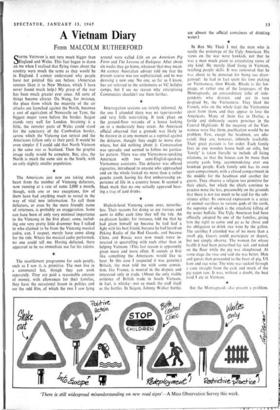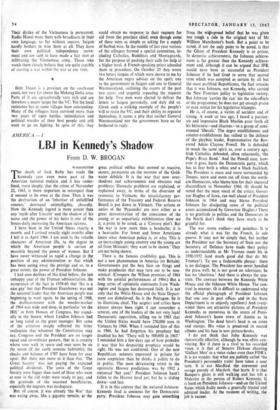A Vietnam Diary
From MALCOLM RUTHERFORD
SCount VIETNAM is not very much bigger than England and Wales. This fact began to dawn on me when I realised that flying times about the country were much the same as they would be in England. I cannot understand why people have not pointed this out before. (American sources liken it to New Mexico, which I have never found much help.) My grasp of the war has been much greater ever since. All sorts of things become clearer. Da Nang, for instance, the place from which the majority of the air attacks are launched against the North, becomes a sort of equivalent of Newcastle on Tyne, the biggest major town before the border. Saigon stands very well for London. Straining it a little, the remoter parts of Wales could stand for the sanctuary of the Cambodian border, across which the Vietcong can retreat and the Americans follow only at their peril. It would be even simpler if I could add that North Vietnam is the same size as Scotland. Then the graphic image really would be complete. But, alas, the North is much the same size as the South, with an only slightly smaller population.
The Americans just now are taking much heart from the number of Vietcong defectors, now running at a rate of some 2,000 a month, though, with one or two exceptions, few of them have had anything much to reveal in the way of vital new information. To call them defectors, or even by the more friendly name of returnees, is probably an exaggeration. Some can have been of only very minimal importance to the Vietcong in the first place; some, includ- ing one very pretty little drummer boy I talked to who.claimed to be from the Vietcong musical cadre, can, I suspect, merely have come along for the ride. Where the musical cadre performed, no one could tell me. Having defected, there appeared to be no immediate use for his talents.
The resettlement programme for such people, such as I saw it, is primitive. The men live in a communal hut, though they can cook separately. They are paid a reasonable amount of money, with allowances for their families, they have the occasional lesson in politics and see the odd film, of which the two I saw lying
around were called Life on an American Pig Farm and The Lessons of Budapest. After about six weeks they go home, whatever that may mean. An earnest Australian adviser told me that the present course was too sophisticated, and he was devising a new one. No one, so far as I know, has yet referred to the settlements as VC holiday camps, but I see no reason why enterprising Communists shouldn't use them further.
Interrogation sessions are strictly informal. At the one I attended there was no tape-recorder and very little note-taking. It took place on the ground-floor veranda of a house looking on to a moderately busy street. An American official observed that a grenade was likely to be thrown in at any moment as a reprisal against the defector, thought they ought to move else- where, but did nothing about it. Conversation was sporadic and seemed to follow no particu- lar pattern. There was one Vietnamese-speaking American with two semi-English-speaking Vietnamese assistants. The defector was offered cigarettes, introduced to anyone who approached and on the whole looked no more than a rather gauche youth having his first embarrassing ex- perience of life in a country house. It seemed a black mark that no one actually appeared bear- ing a tray of iced drinks.
Highish-level Vietcong come over, neverthe- less. Their reasons for doing so are various and seem to differ each time they tell the tale. An ex-platoon leader, for instance, told me that he had given himself up because he had had a fight with his best friend, because he had heard on Peking Radio of the Red Guards, and because China and Russia were now much more in- terested in quarrelling with each other than in helping Vietnam. (This last reason is apparently given more and more often. It sounds at first like something the Americans would like to hear. In this case I suspected it was genuine.) Britain, the man told me with some convic- tion, like France, is neutral in the dispute and interested only in trade. (About the only visible evidence of British trade in South Vietnam, in fact, is whisky—not so much the stuff itself as the bottles. In Saigon, Johnny Walker bottles
are almost the official containers of drinking water.) In Ban Me Thuit I met the man who is surely the prototype of the Ugly American. His views on the war were hawkish, not that he was a man much given to articulating views of any kind. He merely liked living in Vietnam,
teaching people skills. It was rumoured that he was about to be demoted for being too disor- ganised: he had in fact spent his time picking up Vietnamese, then Rhade. Rhade is the lan- guage, or rather one of the languages, of the Montagnards, an extraordinary tribe of inde- pendents who distrust, and are in turn despised by, the Vietnamese. They liked the French, who on the whole kept the Vietnamese apart from them, and they appear to love the Americans. Many of them live in Darlac, a fertile and dubiously secure province in the Central Highlands. If the majority of the Viet- namese were like them, pacification would be no problem. Few, except the headmen, are edu- cated; they are, however, infinitely teachable. Their great passion is for order. Each family lives in one wooden house built on stilts, but 'family' is taken literally to include all living relations, so that the houses can be more than seventy yards long, accommodating over one hundred people. Each family unit has its own open compartment, with a closed compartment in the middle for the headman and another for guests. They observe a religion too primitive for their chiefs, but which the chiefs continue to practise none the less, presumably on the grounds that there is not too much to be said for the sub- stitutes either. Its outward expression is a series of animal sacrifices to various gods of the earth, the supreme of which is the ritualistic killing of the water buffalo. The Ugly American had been officially adopted by one of the families, giving him the right to come and go as he chose and the obligation to drink rice wine by the gallon. The sacrifice I attended was of no more than a small pig. Guests could participate or depart, but not simply observe. The woman for whose health it had been prescribed lay sick and naked on the floor while the pig was slaughtered. At some stage she rose and said she was better. Men and guests then proceeded to the feast of pig, US ham and rice wine. The wine was sucked through a cane straight from the cask and much of the pig eaten raw. It was, without a doubt, the best food I ate in Vietnam.
But the Montagnards also present a problem.
'There is still widespread misunderstanding on new road signs'—A Mass Observation Survey this week.
Their dislike of the Vietnamese is permanent. Radio Hanoi woos them with broadcasts in their own language, so far without success. Saigon hardly bothers to woo them at all. They have their own political independence move- ment and are said to have made a fair shot at infiltrating the Vietnamese army. Those who watch them closely believe they are quite capable of starting a war within the war at any time.
Binh Thuan is a province on the south-east coast, not very far above the Mekong Delta area. Parts of it are agriculturally very rich and are therefore a major target for the VC. Yet the local resistance has in some villages been outstanding. Many of the villagers have survived more than two years of open battles, intimidation and political murder of their best people and still want to go on fighting. In spite of this, they could obtain no response to their requests for aid from the province chief, even though some of these were as simple as asking for a supply of barbed wire. In the middle of last year various of the villagers formed a special committee, in- cluding Catholics, Buddhists and Montagnards, for the purpose of pushing their calls for help at a higher level. A French-speaking priest schooled them in procedure. On October 25 they wrote two letters (copies of which were shown to me by the American negro adviser on the spot), one to the government in Saigon and one to General Westmoreland, outlining the events of the past two years and urgently repeating the requests for help. Two men were elected to deliver the letters to Saigon personally, and duly did so. Given such a striking example of the people's will to resist the VC, and their ability to organise themselves, it seems a pity that neither General Westmoreland nor the government have so far bothered to reply.































 Previous page
Previous page